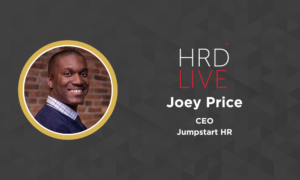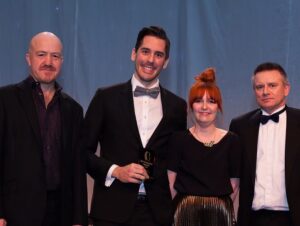Q&A: DHL talks about building a global culture
- 9 Min Read
Joe Mamone is a Global Senior HR Director for DHL Express. He joined HRD Connect to discuss how they unify employees across borders, he will also talk about creating a common culture during M&A’s. DHL Express serves more than 220 countries, what cultural considerations do you need to make to ensure you avoid a cultural […]
- Author: Unzela Khan
- Date published: Jul 5, 2017
- Categories

Joe Mamone is a Global Senior HR Director for DHL Express. He joined HRD Connect to discuss how they unify employees across borders, he will also talk about creating a common culture during M&A’s.
DHL Express serves more than 220 countries, what cultural considerations do you need to make to ensure you avoid a cultural gap between headquarters and local companies?
What we do is, really lean on the old saying ‘Think global, act local’ – we take that to heart and understand that there is a variance around different cultures and different ways of doing business around the world. Therefore we rely on our local talent to manage the environment at a local level to take into consideration all the cultural differences when you’re dealing with businesses across borders. We use a decentralised model where we do allow the countries to take a leadership role and decision making. From a global perspective, we try to create more of a global framework, with a lot of leeway at a local level with managers making decisions locally.
That’s one thing we have found that has been very successful from a DHL perspective. It has allowed the local organisations and local talent to change the needs that they require, based on cultural differences and local needs in legislation as well.
As one of the most international companies in the world, how do you unify your employees across borders?
It starts off with our culture. So we have a global community of international certified specialists, which is basically our baseline or development programme that we put everybody through which is the foundation. We build up on that and ensure everybody has a common understanding around our focus strategy. Through this foundation course, we really help people understand our culture, behaviours and the attitudes that we are looking for within individuals. What we do is, we allow them to have a free reign in their countries accordingly.
What we found was, being able to create this global community is actually a huge help to be able to unify our approach and making sure our customers have a consistent service and experience in dealing with DHL.
DHL have been through a number of high profile acquisitions; how can organisations create a common culture during a period of M&As?
We found that we need to keep our message simple. The CEO has really pushed a very simple message around four areas to focus on which includes motivated people, great quality service, loyal customers and profitable network. The behaviours and the culture is something that we have been trying to instil. Whenever we would acquire or partner up with other organisations to do business, we would help them to understand our culture. We would help them to go through this foundations programme to really get acquainted with the culture and what makes it successful. Keep the message simple, don’t complicate it, don’t come up with a whole bunch of different types of strategies and vision statements, we have to be very clear.
The customer is at the centre of everything that we do and the way we achieve that is through those four key areas. Whenever we acquire an organisation, we slowly move them over to that kind of same mindset.
What can companies do to manage employee engagement globally?
From a global perspective you have got different types of cultures and different types of people. For example often times where you look at western cultures they are a bit more sceptical. They can be more challenging and resisting, whereas in different parts of the world they might be more conforming. When you take a look at engagement overall, from a HR perspective we always look at that as a fundamental consistency across the board. Human beings are human beings and they want to be able to feel trust, they want to have their basic needs met. They want to have management support and opportunity to grow and feel like they are part of a team.
Most of these elements are really basic across the board. So every programme or every initiative that we really drive through the organisation, we try to make sure that it hits those fundamental elements. We also have pretty extensive development programmes for our managers because it all begins with the managers. The manager has a huge part in developing that trust with individuals regardless of where you come from, your background, education, culture or beliefs that you come from. As long as we are able to develop those basic needs, we find that it helps to really try and engage them.
It also goes back to that global community, current beliefs and ways of working, so the certified international programme is vital to the success of the organisation. From an engagement perspective it brings people closer together with one common team and one common message, we try to get the managers to really help drive that into the organisation. When you’re dealing with a diverse engaging workforce, it’s about hitting those really basic things that help drive an organisation.
How does the recognition toolkit motivate employees?
What the recognition toolkit really did was to start to empower managers to take recognition into a little bit more of a consistent way. In the past we have had some managers who are great at it, other managers that are not so great at it. What the toolkit did was provide a basic way of recognising, a reminder for some managers and education for managers to understand how important it is.
What we did was, we rolled out this recognition toolkit to keep it consistent across the board, but that’s just the basic stuff that we do. At a local level we give a lot of autonomy to countries, managers and leaders to really make decisions.
For example, every year we have this thing called the EuroCup where we invite the 40 countries that we service in Europe, we invite employees to come and play a football match – so that is a huge recognition and initiative that we take to bring everybody together. It’s purposeful, the reason why we do it is to help people make those connections and make them feel like they are part of the global community of certified international specialists. They are recognised for their efforts, so we try to take every means and we try to be creative with it when it comes to recognising people. We provided the recognition toolkit to make sure that at least the basics are out there.
What can HR do to ensure employees refocus on core competencies?
I think it’s important for HR to find different ways to help guide managers and individuals to take ownership of their careers. A big part of that is making sure that they are able to develop their careers, and part of that is making sure that they are able to develop their core competencies to be able to become successful. HR is there to simplify it for managers and make it a priority for them to refocus on competencies. HR’s role is also to help fully understand that it is their responsibility. There are often times you find that individuals feel like they are not getting promotions, or not getting the opportunities and that the manager is not supportive enough. So they need to question, what are the things that you first want to do? What do you want to accomplish, where do you want to go? Talk about your career, not your next job – based on that, what do you need to do to develop the skillset or competencies that will get you there? Then ask your manager to support you with that. So we try to help and educate both employees and the managers to go down that line around taking ownership around the individuals career.
I always use the illustration of whenever we make a big decision from a business perspective, it’s based on a business plan. An individual should have a business plan for their career. What is your ultimate goal? What are the things you need to take you there? The manager can help, support, develop and provide feedback to help drive that goal.
Where does the conversation start when HR teams begin a global community concept?
It starts with feedback. We tend to go to the countries to really ask for the business, what are some of the needs, what are some of the barriers, what are slowing things down. We talk a lot about speed here at DHL and it’s one of our behaviours, along with passion.
We also take a look at Google Program, we need to make sure that these programs are put together to support the business, to reduce barriers or things that slow people down so they can focus on the business. So what we do is, we ask for a lot of feedback, information and we also pilot a lot of things locally. What we tend to do as well is we really look at our talent within the countries, and look at great initiatives that are going on and decide which ones we can scale up on a global level.
The reason why we do that as well is because we think about – if it’s successful in a country, then it could potentially be successful on a global scale.
The one key thing that we make sure that we do is, whenever we scale something up to a global level, we make sure that we provide a framework so that there is a lot of flexibility for a local country or a local management to really customise according to their local needs, but always providing that over-arching global framework to be able to support that. That is how we approach our global initiatives.






